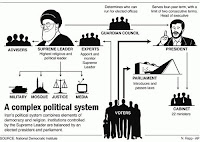Iran's political system simplified

May be one of the most misunderstood countries of the world today is Iran. Reading and hearing reports of Iran, written by mostly uninformed reporters, whose knowledge of Iran limits itself in 2 meals consumed at some Persian restaurant in some big city. Furthermore, their self-assertions sometimes crosses the barriers of ignorance and as a reader one feels irritated and frustrated. Some call it disinformation, but I would like to call it irresponsible illiteracy. I take it upon me to simplify the A-B-C of the Iranian political hierarchy for any one interested to know from top to bottom, who knows maybe it helps to neutralize the stultification of some western news consumers, should they bother to read.
Supreme Leader / This position is elected by the Assembly of Experts,the "Leader" is the commander in chief of all armed forces and can have the last say in all major issues of internal or foreign relevance, Radio and TV heads are named by the Leader,Head of the Judiciary is also appointed by the Leader and the Leader has the right to "Veto" laws.
President / Head of the executive branch in the republic and elected every 4 years by popular vote.
Assembly of Experts / A body of 86 clergies , elected directly by popular vote every 8 years, and its duties are amongst others the selection and supervision of the Leader, they have the power to remove the Leader and they are by law committed to assemble twice annually.
Parliament / The legislative body of Iran, has 290 seats and its members elected every 4 years.
Guardian Council / A body of 12 appointed "Jurists" of which 6 are appointed by Leader and 6 appointed by the Parliament, this body is charged with guarding the integrity of the constitution and supervising elections and candidates.They also double check every passed law by the Parliament for its compatibility to the Constitution and Islamic Laws.
Expediency Council / This council is appointed by the Leader to mediate eventual discrepancies between the parliament and the Guardian council on issues of law interpretations, they are appointed on a 5 year basis and number around 30 members. They also have strong advisory duties towards the Leader.
Judicial power / This body represents the independent judicial system of Iran and
is based on the "Sharia". The head of the Judiciary is appointed by the Supreme Leader. The system is "inquisitorial" (very much like the French System) only in cases involving the "Media" a jury is allowed.(like the British system)
Supreme National Security Council / This body has the duty to decide on the method of implementing and safeguarding sensitive political and international issues, policy making and coordinated acting, its secretary is always selected by the President and its members are all the "Alpha" elements of the Iranian political system i.e. head of parliament, cabinet members, military commanders and etc.
City and Village Councils / Directly elected every 4 years by popular votes and are responsible for electing mayors and activities of social, cultural, educational and welfare requirements of their constituencies.
I am sure if Iran were to recognize the state of Israel, the western media would not be calling Iran a dictatorial state or a state sponsor of terrorism or an axis of evil or etc. etc. Rather the western media would be picking on some western allies a la Egypt or Saudi Arabia and the rest of some of these Arabian draconian states who really are dictatorship states and sponsor extremism and terror!!! unfortunately as long as we don't have an independent free thinking media system, this kind of wanton disinformation shall continue.


Comments
As I see it, the founders of the Islamic Republic consciously faced the same problem America's constitutional fathers faced: how to prevent dictatorship. They answered in essentially the same way, as well: checks and balances.
Of course, practice has never been perfect. In the US, corporations, and government-allied media, and the emerging imperial presidency undercut the democratic structure laid out in the Constitution; in Iran, the Supreme Leader so much power that the temptation to interfere in politics by screening opponents out before they can even run for office has proven irresistable.
This process of power corrupting has now, it seems to me, led to exposure of the great secret compromise on which the Islamic Republic's state structure is based. The compromise is that it is based on two pillars - the Islamic leadership of Allah's representative (velayat-e faqih) and electoral legitimization. The "secret" is that these two concepts are directly contradictory.
Khamenei has exposed the secret by giving in to corruption (i.e., by interfering in the electoral process). This has caused the collapse of the compromise and made it necessary for all the members of the elite who had previously avoided looking too closely at this compromise to choose sides, i.e., do they now support Islamic dictatorship or electoral legitimization?
As we all witnessed the American system was also abused by the Bush/Cheney system and now the US is in the process of recuperation and if I am not mistaken, his (Bush)election was also very much questionable.
Iran's very young system might not be to the taste of many in the west,but it is a system that had arisen from a revolution, and it takes many developments and crisis to force itself to better.
You might disagree, but what is happening in Iran is a normal procedure for the development of a democratic process. One experiences inefficiencies along the way and tries to solve them.
But it has to happen from within and with patience. As people in the US realized how vulnerable their democracy to abuse is, Iranians must see this as a chance to find and better their system which brings more tolerance for opposition.